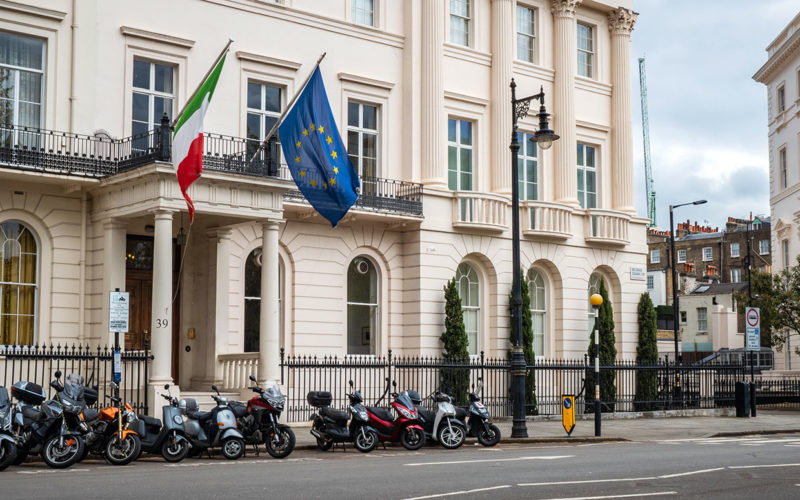In many cases when applying for Italian citizenship, you can choose whether to apply in Italy or abroad. Find out more below…

Applying for citizenship via an Italian municipality
If you are able to travel to Italy, it is often a much quicker process than applying at an Italian consulate.
The most important first step is to collect your documents.
All vital records issued outside Italy will need certified translations in Italian and Apostilles to legalize them.
To apply in Italy at a municipality, you do not need to get a visa.
You can travel directly to Italy, but if your passport isn’t stamped (if you have arrived in another EU country first), you’ll need to submit a dichiarazione di presenza at the local immigration office within eight days of arrival in Italy.
You should also obtain an Italian tax code (codice fiscale) as soon as possible from the local Agenzia delle Entrate, because it will be necessary for many aspects of Italian life.
Another important step upon arrival is to establish residency. Take care in selecting an apartment with a contract that allows legal residency, as a transitory contract, or contratto transitorio, a short-term lease, is very common in tourist cities and generally does not allow one to declare residency with it).
Note that upon registering residency, the local police will check to ensure you live at the property. This must be done within 45 days.
Only after residency has been finalized can you apply for citizenship at the municipality of the town where you reside. This does not need to be the same town where your Italian-born ancestor came from.
Different municipalities might have different requirements for the documents needed for citizenship, and some municipalities might not be familiar with citizenship by descent at all.
For this reason, it is important to research the best cities to apply for citizenship.
Once you have applied at the municipality, you’ll need to apply for a residence permit, (permesso di soggiorno in attesa di cittadinanza).
This allows you to remain in Italy past the 90 days allotted for non-EU citizens while the municipality finalizes your citizenship application.
This processing time varies from city to city and is dependent on the case.

Applying from abroad via the Italian courts
Applying for citizenship by descent via the Italian courts is a more flexible option for those who cannot be physically present in Italy.
However, it is only available for those in need of a court case, specifically those involving a female ancestor (“1948 cases”) and those who are appealing the courts because they either haven’t received an answer on their citizenship within the timeline established by law or because they feel their citizenship was wrongfully rejected.
If you have a woman somewhere in your line who had a child before 1st January 1948, you will need to apply for citizenship through the Italian courts.
You do not need to be present in Italy for this – a lawyer can act as power of attorney for you. This is a service that ICA offers.
While there is no guarantee that the lawsuit will be won, the vast majority of cases since 2009 have been approved. The timeline is usually 12-18 months.
Alternatively, if you applied for citizenship via an Italian consulate but haven’t received a response in 730 days, then you can bring your case to the Civil Court for an immediate answer.
Another way you can apply through the courts is if your local consulate gave you an appointment more than two years in the future.
In such instances, you can bring your application to the Civil Court.
Finally, if you feel your citizenship was wrongfully denied by the consulate, you can appeal to the Administrative Courts.

Applying via an Italian consulate
The last route to apply for Italian citizenship abroad is through the Italian consulate. This must be the consulate that covers the jurisdiction you reside in.
Among the documents to submit, you’ll need to include proof of residence, which can be an ID document, a utility bill, or a bank statement.
You will also need vital records, but in most cases, you won’t need certified translations, only professional ones, unless you are applying to a consulate outside the United States.
Your consulate might also only require vital records from the direct line of descent, and there are a number of forms to fill out. In short, always check your specific consulate’s requirements.
To book an appointment, you will need to create an account on the online booking portal, Prenotami.
Once your citizenship has been approved, you can then register with A.I.R.E. (Registry of Italian Citizens Residing Abroad) and apply for an Italian passport.
There are significant differences when it comes to applying for Italian citizenship abroad, or in Italy, but ultimately, each pathway is dependent on the individual’s circumstances.
The fastest route is to apply via a municipality, but living in Italy for the duration of the application process is not always feasible.
This article has provided a basic overview of the processes so each applicant can make the best decision for his or her situation.
If you are interested in applying for Italian citizenship, or need other assistance, don’t hesitate to visit Italian Citizenship Assistance.
Featured photo © pxl.store/Adobe Stock
